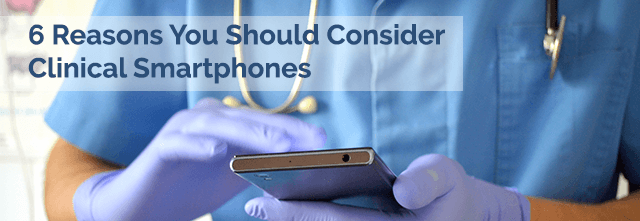Healthcare organizations need mobile, reliable, and durable communication devices to support the critical interactions between staff and patients. The combination of pagers, consumer grade smartphones, and disconnected alert systems disrupts the flow of information between patients and providers. Every moment lost puts patients at a greater risk, reducing the delivery of quality care. Clinical smartphones remove these needless delays by allowing staff to communicate and allocate resources in real-time.
1. Clinical Smartphones Can Reduce Noise Pollution
Clinical smartphones seamlessly connect patients to providers through wireless handsets. Dedicated clinical smartphones give care providers information in real time while enabling floor staff communication without downtime. This efficient flow of critical information reduces noise pollution by eliminating overhead paging and other alert systems. Peer reviewed studies all show that noise pollution delays patient recovery. Any reduction in noise pollution instantly improves quality care and patient satisfaction.
2. Clinical Smartphones Are Durable
Using consumer grade equipment in the clinical setting is expensive. Communication devices are constantly being dropped, bumped, and disinfected with high grade, caustic cleaning solutions. Health care organizations that combine the use of pagers with consumer smartphones will see, in the long-run, increased expenses from the fees associated with replacing consumer grade smartphones. Dedicated clinical communication devices are made to withstand the abuse of hospitals and other health care settings. A dedicated smartphone solution can be repeatedly dropped and disinfected without losing any functionality. Nurses no longer have to worry about their devices not working, neither do the coordinators in charge of routing information between staff.
3. Clinical Smartphones Support SaaS Investments
Nearly 86% of hospitals still use pagers as the primary means of information transmission. Pagers, aside from contributing to a noisy overhead alert environment, can not take advantage of the cloud and hybrid-cloud architecture investments healthcare organizations are making. The move towards cloud solutions comes with the ability to quickly deploy robust applications. Pagers prevent healthcare organizations from taking advantage of designated SaaS applications. Clinical smartphones integrate and scale with SaaS solutions, cutting into the major care delivery-delay issue that many care settings continue to face.
4. Clinical Smartphones Are Secure
Consumer smartphones are not secure. They are more susceptible to malicious data breaches and less forgiving when it comes to human error. A dedicated clinical smartphone solution can integrate with existing IT, HIPAA, and data security protocols. This enhances the security of the critical patient information shared between clinical staff.
5. Clinical Smartphones Integrate with Other Systems
Healthcare organizations are comprised of multi-layer, complex communication systems. Clinical smartphones are deployed with those complexities in mind. Existing IT infrastructure, biomedical devices, telephone systems, and call / service systems can merge with clinical smartphones to even further bolster efficiency and improve quality of care.
6. Clinical Smartphones Reduce Downtime
Inefficiency prevents healthcare organizations from realizing increased patient satisfaction and improvements in quality care. Inefficiency in medical facilities is amplified when there is a delay in getting the information generated by patients to the correct series of care staff. Downtime delays quality care provided by increasing the time it takes for care staff to deliver services. Downtime is caused by:
- Too many layers of communication between patient data and care providers.
- The naturally occurring time lags between devices.
- Complete network outages that result in healthcare organizations scrambling to operationalize backup communication processes.
Downtime also hurts a healthcare organization’s revenue stream by leading to services redundancy and complicating the patient hand off process.
Clinical Smartphones by Spectralink
Spectralink CARE handsets enable real-time information transmission between patients, clinical care providers, and floor supervisors. Spectralink clinical smartphone solutions minimize downtime by streamlining the flow of critical information and reducing device clutter. Spectralink wireless handsets are made for mobility and can instantly connect care staff regardless of the size or structure of the clinical care setting.
Spectralink clinical smartphones are secure and integrate with highly specific SaaS applications such as HIPAA solutions, EHR portals, project management workflows, and multiple alert and alarm systems.
When communication matters most, such as times of emergencies or unusually patient volume, Spectralink clinical smartphones will be resilient to network outages.
For medical facilities, nothing matters more than quality of care and patient satisfaction. Solutions provided by Spectralink enable care providers to make better choices and deliver services based on the most up to date information.
Altura Communication Solutions can help your healthcare organization integrate and deploy a Spectralink CARE solutions package.
Contact Altura today.




Comments are closed.